One of the significant drawbacks of hardwood flooring is that it does a lot of damage to the environment. Solid hardwood flooring is made from trees that take a long time to mature. Thus, hardwood floors are a terrible choice if you care about sustainable flooring at all.
The answer to this problem comes in the form of bamboo and cork flooring. Originating from fast-growing plants, these flooring types have a negligible impact on the environment. However, this is not the case with solid hardwood flooring. While having a visually striking floor is lovely, one must consider the potential damage done to the environment with every flooring project. With both bamboo and cork as a flooring material, you can have natural flooring while still being environmentally conscious.
Now that we’ve explained the main reason to get into sustainable flooring let’s analyze the day-to-day aspects of bamboo vs. cork flooring.
Bamboo Floors
Bamboo floors have recently increased in popularity, especially as an alternative to solid hardwood flooring. It’s not only floors, though – you can buy all kinds of bamboo products for your home: tables, chairs, shelving, etc. Still, what are the general characteristics of bamboo, especially concerning its use as a flooring material? Don’t worry; we got this covered.
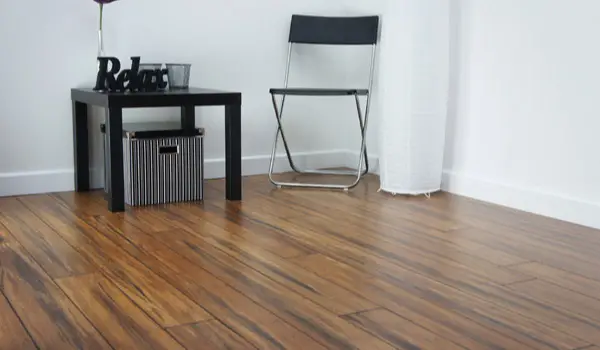
What Is Bamboo?
Even though you’ll have difficulty telling bamboo and hardwood floors apart, bamboo is not a type of wood. Instead, it is a type of fast-growing grass. You can compare bamboo to some solid hardwoods in terms of looks; however – bamboo has a different cellular structure.
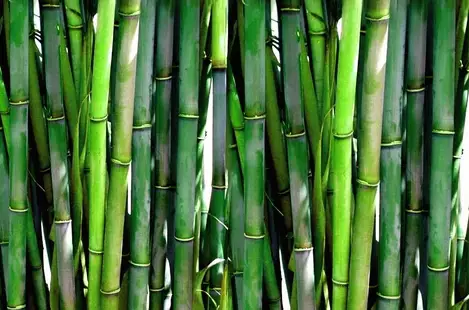
The quick growth rate is precisely what makes bamboo a renewable resource. Coupled with the fact that it looks almost exactly like hardwood, it’s easy to understand why bamboo is among the most popular flooring options. You can even choose between a horizontal and a vertical grain for your bamboo planks. What’s more, the surface patterns of bamboo closely match those of wood.
Is Bamboo Tough Enough?
We’ve established that one of the differences between bamboo and hardwood is that technically, bamboo is not a type of wood. Still, is it hard? Yes, quite. According to standardized tests, bamboo flooring has the same hardness as oak. Resilience and durability should not be a problem with a bamboo floor. It will easily withstand foot traffic in your home. Feel free to wear high heels as well – high-quality bamboo flooring will not give in to the pressure.
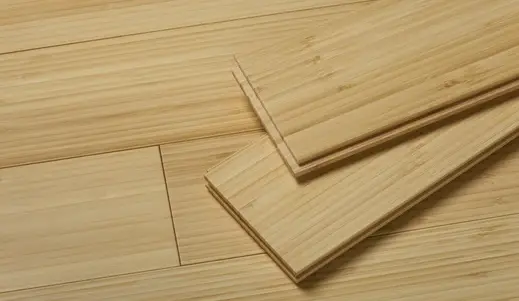
Many people think that because bamboo is a type of grass, it should be naturally water-resistant. However, while it is true that bamboo floors resist water better than hardwood flooring, you still need to be careful. For maximum longevity, treat bamboo the same way you would treat traditional hardwood: seal it with a suitable finish, avoid spills and if they happen, clean up quickly. When doing regular dust mopping, don’t use a lot of water – use a damp mop instead. With that said, you can still consider water resistance to be one of the many bamboo flooring pros.
How’s the Price and Installation?
Installation is practically the same as any solid hardwood flooring option. You can have the flooring glued down or install it as a floating floor. In either case, you will probably need a professional to install bamboo flooring, and professional installation will translate into a slightly higher labor cost. Luckily though, bamboo flooring itself is relatively cheap, owing to the quick growth rate of bamboo grass and the simplicity of the manufacturing process. Therefore, the total cost of bamboo flooring per square foot is much lower than solid hardwood.
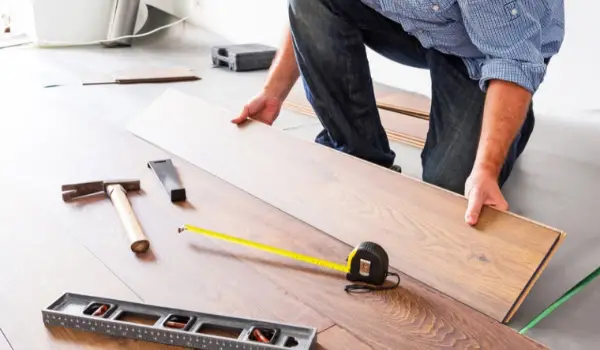
Cork Floors
Cork flooring has been around for some time now, enjoying occasional popularity since the turn of the 20th century. However, cork is now back in the floor game, owing to a rise in environmental awareness. Let us do an in-depth analysis of cork flooring.
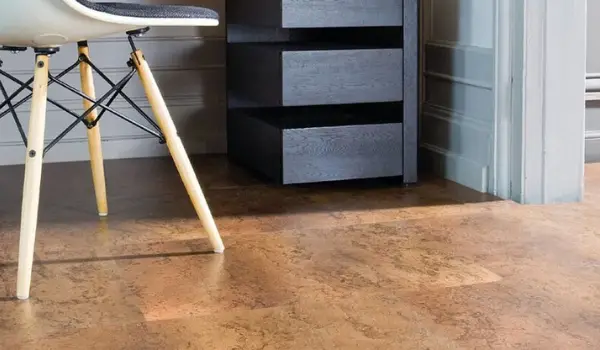
Cork? Isn’t that for Wine Bottles?
You’re right! We all use cork to plug wine bottles, but it’s a much more versatile material. First things first, though – what exactly is cork? Cork is a sustainable natural material originating from the bark of a cork oak tree. You need a mature cork oak tree to harvest cork, usually around 25-30 years old. After the first harvest, the tree can be re-harvested after about nine years. The harvesting process makes cork floors sustainable – no trees are cut down during the production of cork flooring. The cork tree will quickly grow its bark again and live a long, healthy life. In the case of hardwood flooring production, grown trees are wholly cut down, significantly impacting environmental changes.
Is Cork Durable Enough for Flooring?
We all know cork is a relatively soft material. Further, it differs significantly from hardwood and bamboo, as both are pretty solid. However, cork has other qualities that rank it high among flooring choices.
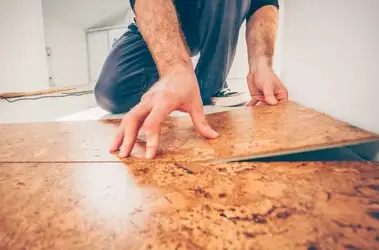
You see, the fact that cork is slightly soft and spongy means that walking and standing on it is very comfortable. It’s perfect for your home, especially if you don’t wear shoes inside – the give of cork feels very pleasant, and it doesn’t tire your feet as hard flooring does. After you step off, the cork pops back up again to its original thickness. However, in some scenarios, cork isn’t as durable as most floors. You must be careful not to drag heavy furniture around with cork flooring. Use furniture coasters instead, or better yet – lift your furniture when moving it around. Keep high heels off your cork flooring, as they will pierce right through it.
As you already know, one of the most widespread uses of cork is to plug wine bottles. The use in wine bottles is due to cork being naturally resistant to water. The material is so resistant that it is impermeable – hence, its long-standing use in the wine industry. The water-resistant qualities of cork flooring mean that it’s perfect for areas where the risk of spills is high – your kitchen, for example. If you spill liquid on cork flooring, don’t worry about it. It won’t expand or stain as solid hardwood flooring does. Still, for daily cleaning, use a damp mop instead of a bucket of water.
Is Cork Expensive and Difficult to Install?
No and no. Let us explain.
We mentioned that you don’t need to cut trees down to make cork flooring. Due to this, the cost of cork is only a fraction of the cost of solid hardwood. In fact, cork flooring is priced similarly per square foot as bamboo flooring. It doesn’t get much cheaper as far as natural flooring options go.
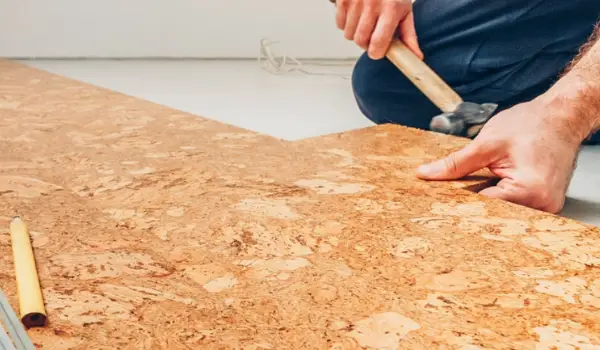
Let’s get into the installation method: you will be pleased to hear that cork flooring installation is very straightforward. Cork flooring is so flexible that it comes in rolls instead of planks. The installation procedure is similar to that of laying carpet. As is the case with a carpet, you can choose between gluing the cork to your subfloor or installing it as a floating floor. Installing cork flooring is so simple that we’d even say that it’s suitable for a DIY project if you’re brave enough. On top of everything, you can even buy cork tiles which are especially simple to install.
Choosing Between Bamboo and Cork Floors
Both cork and bamboo flooring options share a few similarities. First, cork and bamboo are sustainable natural materials, ideal for the environmentally-conscious homeowner. Second, they’re both pretty cheap, about the same price per square foot, and much more affordable than wood flooring. However, apart from this, cork and bamboo flooring offer very different user experiences.
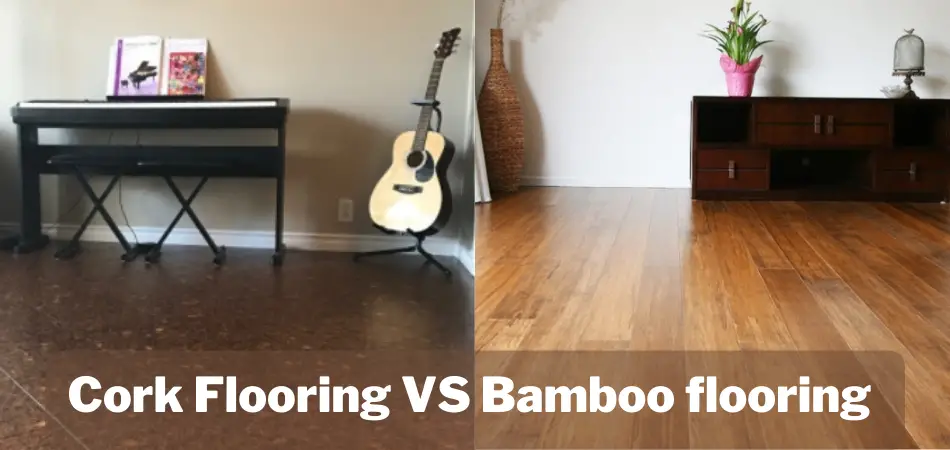
Bamboo flooring is the perfect substitute for traditional, solid hardwood floors. It offers the same benefits – it’s natural, durable, and aesthetically pleasing. On top of all that, it’s very eco-friendly and somewhat moisture resistant. Interestingly, bamboo flooring is also much easier on the wallet than real hardwood. When you take all of this into account, there isn’t much reason to go for wood when choosing your new flooring.
On the other hand, cork flooring is not very similar to wood or bamboo, for that matter. It does not offer the characteristic wood grain aesthetic, and it’s not hard either. However, a cork floor has a couple of tricks up its sleeve. Its softness shouldn’t be considered a drawback – it’s actually one of the many cork flooring pros. The softness of cork vs. bamboo flooring can add a degree of comfort that you cannot get from hard flooring materials. Also, there is water resistance, a field in which cork flooring is unmatched among natural materials. Finally, the simplicity of installation is a strong point of cork, especially in tile form.
Wrapping It up
As you can probably tell, when comparing cork and bamboo, there isn’t a clear winner for the best flooring type. Instead, it’s a matter of personal preference. No matter the type of flooring you choose, you’ll be one step closer to a completely eco-friendly home with cork and bamboo. Both cork and bamboo flooring have their unique set of strengths and drawbacks, so you must take your needs into account before making a choice. Either way, with cork and bamboo flooring, you’re sure to get a beautifully finished floor, and with proper maintenance, they will both last you a very long time.